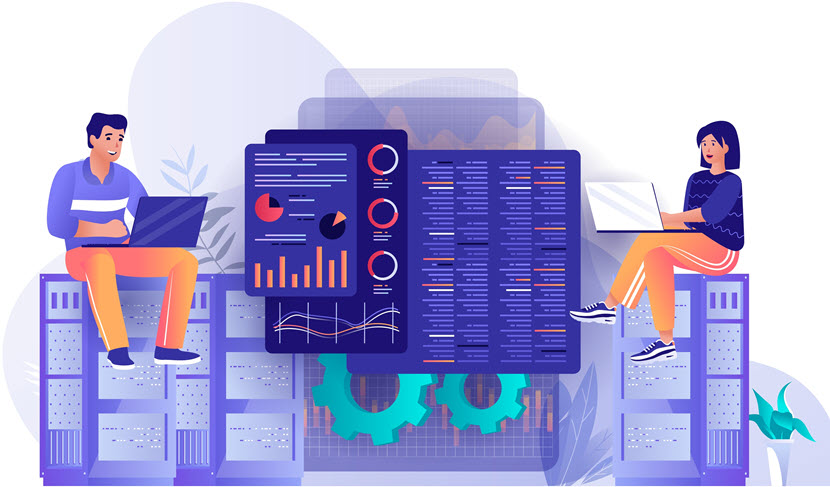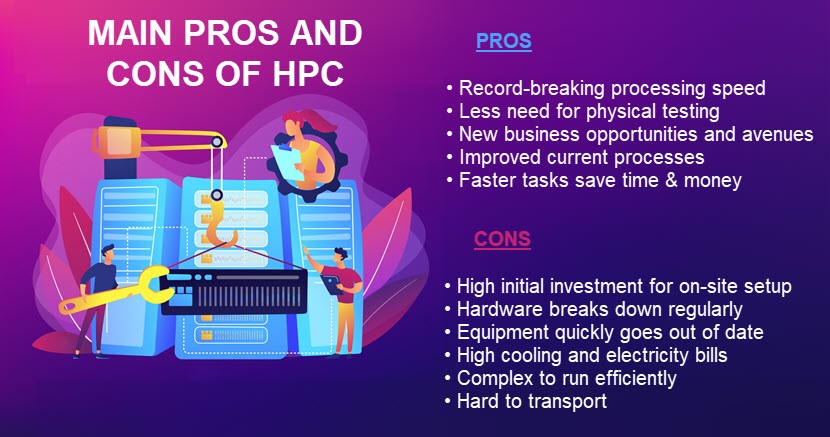Some workloads are too large, complex, or time-consuming for a single PC to handle. This article provides an introduction to high-performance computing, and how it will impact the way businesses operate. Read on to learn what HPC is, how these systems work, and why high performance computing promises to push the boundaries of enterprise IT.
What is High Performance Computing?
High performance computing (HPC) is the practice of performing data calculations at incredible speeds by using multiple compute servers that work in parallel. These groups of servers (clusters) can have hundreds or even thousands of interconnected computers (nodes) that work simultaneously on the same task.
To put it into perspective, a standard desktop with a 3 GHz processor can perform around 3 billion calculations per second. An average HPC system can perform quadrillions of calculations per second. While not every system requires an extreme processing speed, HPC is essential for advanced, time-consuming use cases that rely on: Find out how do HPC and AI work together and whether you should invest in a mix of these two technologies.
A casual user does not have much use for high performance computing. HPC is primarily used by organizations who deal with large amounts of data or run CPU-intensive apps. Here are a few exciting examples:
Analyzing disease progress of millions of patients to discover insights and sickness patterns.
Running a car crash simulation without having to test a vehicle physically.
- Analyzing millions of credit card records to identify fraud attempts.
- Simulating the impact of airflow on the wings of an airplane.
- Identifying next-gen materials (e.g., for better batteries or more resilient buildings).
- Not long ago, the only users of high performance computing were state agencies, research institutions, and top-tier corporations. These organizations were the only ones that could afford to set up an HPC system on-site.
- Nowadays, cloud computing has democratized HPC, so companies of all sizes can solve compute-heavy computational problems within reasonable time and cost parameters.
Read about quantum computing, a cutting-edge tech that relies on quantum mechanics to solve problems too complex for a classical computer. Like HPC, quantum computing performs data processing at speeds an ordinary device cannot achieve.
How Does HPC Work?
A standard computer performs tasks on a queue-based, transaction-by-transaction basis. An HPC cluster uses all available resources to complete as many tasks as possible at the same time. In an HPC architecture, hundreds of nodes work in parallel to boost the processing speed. Once an engineer integrates and configures nodes, a distributed processing software framework (like Hadoop MapReduce) splits computing tasks evenly between all computers on the network.There are three hardware and system designs that enable an HPC system to provide high processing speed:
Parallel computing:
This technique allows hundreds of processors to run calculations at the same time.
- Cluster computing: Cluster computing enables an admin to set up a collection of computers that work together as a single resource. Such a system must have a scheduler that keeps track of available resources.
- Grid and distributed computing: This type of computing connects the processing power of numerous computers within a network (either at a single or across multiple locations).
- Each component within an HPC system (computer, networking, storage, etc.) To achieve peak performance, each component of an HPC system (computer, networking and storage) must be in sync with one another. For example, the networking component must keep up with the speed of data moving between on-site servers and cloud storage.You can run two types of workloads on an HPC system:
Embarrassingly parallel workloads:
An admin can divide these computations into small, simple, and independent tasks. Such tasks run at the same time with little to no communication between them.
- Tightly coupled workloads: These large workloads require you to break them into smaller tasks that must communicate during processing.
- Depending on your use case, you can run HPC either on physical hardware or in the cloud (or both if you choose to set up a hybrid architecture). Either way, Linux is by far the most popular OS for HPC.HPC Use Cases
Here is a list of use cases HPC can either speed up, improve, or flat-out make possible:

Various FinTech use cases (automatic and high-frequency trading, AI-based credit card fraud detection, real-time tracking of stock trends, complex risk analyses, self-guided tech support, etc. ).
Predicting and tracking storms and other unusual weather patterns.
- Various healthcare uses (vaccine research, testing drugs and new cures, speeding up screening techniques, analyzing patient diagnoses, developing new therapies, studying disease patterns, etc. Use cases in genomics (sequencing of DNA, drug interaction analysis, protein analyses, genome map, etc.). Oil and Gas use cases (testing of reservoir models, spatial analysis, locating new resources for oil and gas, running a wind or seismic simulation, etc.). ).
- Flight training for pilots and simulations for airplane testing (e.g., airflow over the wings of planes or structural strength tests).
- Entertainment and media use cases (rendering special effects, live event streaming, transcoding media files, processing an AR or VR video game, real-time image analysis, etc. ).
- Analyzing massive amounts of end-user data to improve customer service and find better fits for product offers.
- Discovering next-gen materials for batteries, buildings, semiconductors, etc.
- Running advanced blockchain programs.
- Government use cases (climate modeling, nuclear stewardship, space exploration, etc. Retail use cases (inventory analyses, logistics and supply-chain optimization, sentiment analysis etc. ).
- Life science use cases (molecular modeling, biology simulation, and protein docking).
- No matter how compute-intensive your workloads are, pNAP’s HPC servers can ensure you have enough processing power, storage, and memory to run your HPC use case.
- Advantages and Disadvantages of HPC
- All technologies come with pros and cons, and high performance computing is no exception. Let us look at the main advantages and disadvantages of HPC.
- Advantages of High Performance Computing
- Here are the primary advantages of HPC:
Processing speed:
The whole point of HPC is to provide fast processing, which is undoubtedly its biggest benefit. HPC systems can perform extreme amounts of computations in seconds. A regular processor could take weeks or months to accomplish the same task. HPC enables these speeds with cluster/parallel computing, the latest CPUs and GPUs, low-latency networking, and block storage devices.
Reduced need for physical testing:

You can use HPC to create simulations and minimize (or even outright eliminate) the need for physical tests. Whereas some teams use this advantage of HPC to save time, others (such as car manufacturers and airline companies) also cut costs by removing the need for building and destroying prototypes.
Fault tolerance:
- If one node fails, the rest of the HPC system continues to run. HPC allows a company run data-intensive tasks on a larger scale. From product design to tracking patterns, HPC opens new possibilities that were never realistically available to an enterprise, let alone an SMB.Improvement of existing processes:
- The capability to crunch numbers and analyze data quicker also enables an admin to streamline current processes and tasks.Faster tasks lead to lower costs:
- HPC enables an app to run and get results more quickly. You will save time and money over the long term. Also, a cloud-based HPC system enables you to rely on a pay-as-you-go model that further reduces IT costs by cutting overhead expenses.Whenever deciding whether to run something on-prem or in the cloud (HPC-related or otherwise), you must know the difference between capital expenditure (CapEx) and operational expenses (OpEx). Our CapEx vs OpEx article offers an in-depth breakdown of the two cost models.
- Disadvantages of High Performance ComputingHPC offers something an ordinary business has never had before, but the technology does pose certain challenges. HPC has some major disadvantages:
- High initial capital expenditures:If you want to install an HPC system at your site, prepare to spend a lot of money. It is expensive to purchase and maintain hundreds of compute nodes. Expect high upfront costs of hardware, a capable technician team, and an on-prem data center.
- Ongoing costs: Maintaining a supercomputer comes with high cooling and power bills.
Aging on-prem infrastructure:
As on-prem HPC equipment ages, the system’s performance will deteriorate. A high number of nodes will increase the likelihood that one will fail. This will require you to constantly fix your HPC system in order to keep it at 100%. Lack of portability:
The code developed for a HPC cluster may not work well on another system. Also, moving the entire HPC environment from point A to B can take weeks or even months.
- Challenging to run: Running an on-site HPC cluster is complex and time-consuming. Be prepared to pay higher salaries than your competitors or expect low retention rates. Waiting around for hardware to arrive can slow down the pace of on-site research.
- Most of these barriers to HPC do not exist if you rely on cloud computing instead of on-prem hardware. Our article on the advantages and disadvantages of cloud computing helps evaluate whether on-demand IT is the best choice for your business.Future of High Performance Computing
- Organizations across numerous industries are turning to HPC in pursuit of faster analysis of big data and next-gen simulations. As a result, experts predict that the HPC market’s value will grow to US$44 billion by 2022
- and US$50 billion by 2023
- .In the following years, the tech will have the most immediate impact on the following verticals and use cases:
- Precision medicine.Fraud detection in FinTech.
- Personalized interest rates.
- Business intelligence.
- Seismic analysis.
- Customized marketing.
- Chatbots.
- Internet of Things (IoT).
- Smart cities.
- Self-driving vehicles.
- Deep learning and neural networks.
Data warehouses. - Companies within these niches will rely on HPC to speed up research and innovation as they get to devote more computing power and capacity for their use cases.
- Cloud computing will also play a massive part in the expected growth of the HPC market. Cloud-based HPC deployments allow businesses to avoid the cost of data center infrastructure as well as ongoing operations. Moving HPC workloads to the cloud also:
- Decreases time to market.
- Enables users to ramp resources up or down to adjust to current IT needs.
- Provides access to the latest tech (newest and fastest CPUs and GPUs, low-latency flash storage, RDMA networks, and top-tier levels of cloud security).
- Container technologies will also gain momentum in the HPC market. Containers help meet the requirements of many HPC applications, including scalability and reliability. They also provide automation and security. In our article on data centers, we will guide you to the right partner to meet your hosting requirements. Cloud computing has made HPC more accessible and affordable for businesses of any size. High performance computing will remain a mainstay until we find a way to increase its processing speed.
